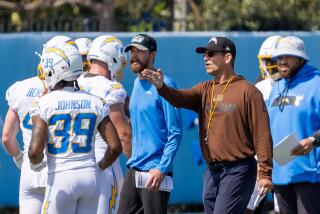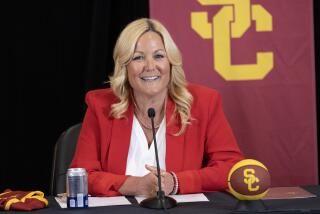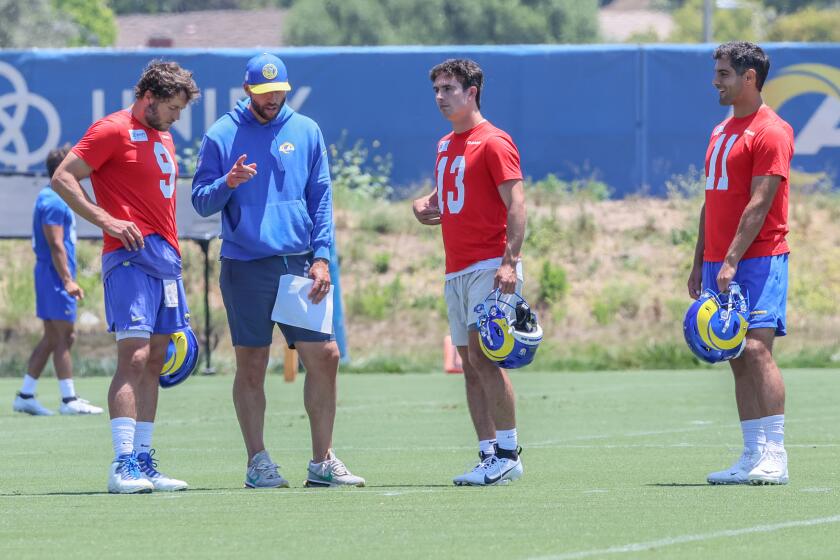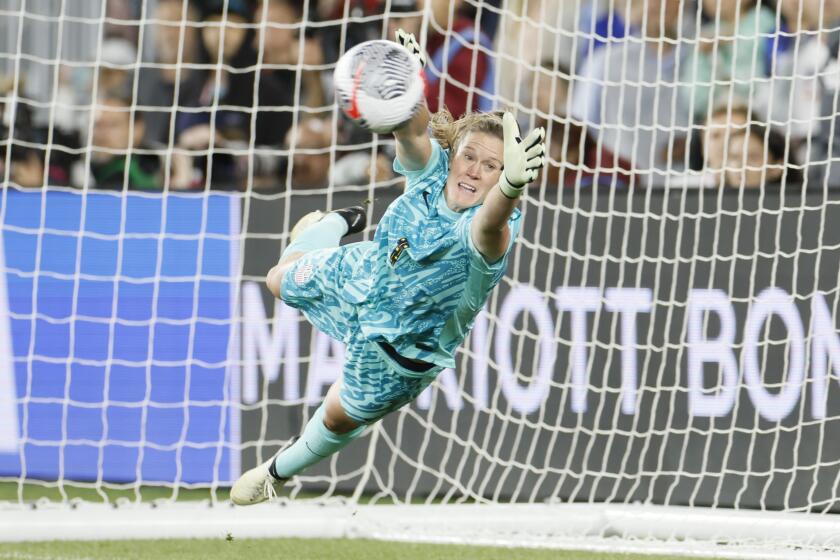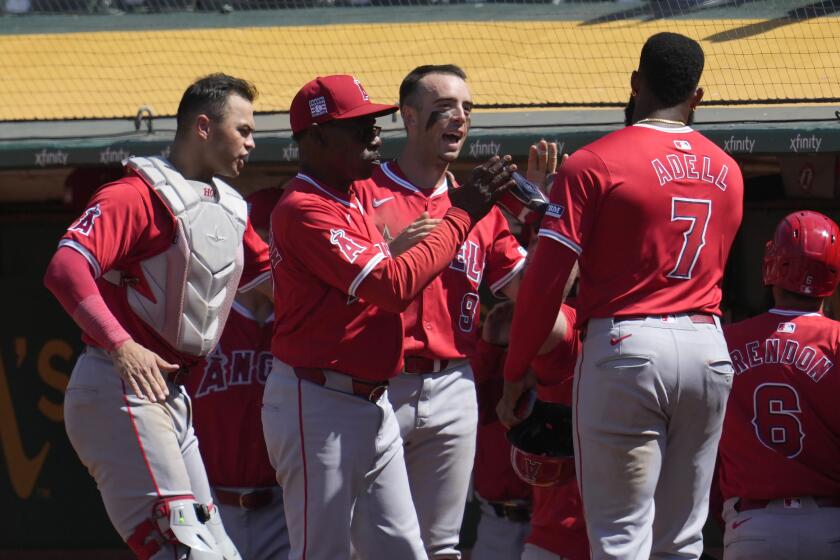Ward’s Many Happy Returns : 2-Time Indy 500 Winner Drives Home the Memories
Every May, Roger Ward packs his golf clubs and digs out his fondest memories and heads for the Indianapolis Motor Speedway. For Ward, it’s a free ride. Sports Illustrated pays his way, returning him to act as a host during the weeks leading up to what is considered the most prestigious automobile race anywhere.
Not just anyone is afforded these kind of luxaries, though. You have to be special. Roger Ward is.
Ward, 65, and now residing in Canoga Park, is a two-time winner at the old Brickyard. That puts him in a group of only 12 drivers who have won the race at least twice. Five have won it three times. Only one, A.J. Foyt, has won it four times in the race’s 69-year history. If Ward was a baseball player, his accomplishments of winning the 1959 and the ’62 500s, would be automatic credentials to the Hall of Fame.
Ward returned from Indianapolis earlier this week, a victim, like the race, of persistent rain that delayed the 70th running of the race almost a week. Away from the hustle-bustle and the roar of 750 horsepower engines, he settled back into the calm of his Canoga Park home to work on some business ventures he’s involved in. He’ll watch today’s race on television. He can’t remember the last time he missed being at Indy for the race.
Ward seems to prefer talking about the magnitude of the event rather than his own accomplishments during a 15-year championship car racing career.
“It will always be the most prestigious race in the world,” he said of Indy. “It’s on par with the Kentucky Derby, the Rose Bowl. There are lots of bowl games now, but the Rose Bowl will always be the most honored.
“Years ago, I had an occasion to race in Australia,” he said. “The guy from the news media who interviewed me told me that my name was more known in Australia than the guy who won the world championship that year, just because I had won at Indy.”
Ward’s experience at Indianapolis is a bit slower-paced these days. For the past several years, he has been one of the 100 guests that Sports Illustrated brings in for the race. He has also dabbled as a radio and TV announcer for the Indianapolis track since his retirement from championship racing in 1966. He says he is treated with all the respect of nobility at the track.
He acknowleges all of the obvious changes in racing The Brickyard over the past 25 years--the sleeker, faster cars; the driver’s lifestyles--but he’s particularly interested in the vast cosmetic changes that have been made. The most significant is the number of bricks at the facility. There are fewer. And Gasoline Alley is new.
“Over the years there have been some dramatic improvements,” Ward said. “Areas that created a hazard to drivers have been improved. There are more grandstands and new suites. The garage area was the last of many improvements--and probably past due.”
May brings out Roger Ward’s winning attitude. Not once, but twice, Ward drove 200 laps at the Indianapolis Motor Speedway and won. The first time was in May, 1959, when he averaged 135.8 m.p.h. He won the United States Auto Club National Championship the same year. Three years later, he won for a second time, averaging 140.3 m.p.h. Again, he earned another USAC championship.
Ward was a noted hard driver of his Offenhauser-powered championship car. He had a similar reputation off the track. He said there was never a shortage of parties and people to attend them with.
Times were a bit wilder for Indy drivers in those years. Drivers would think nothing of racing, drinking all night, then racing the next day.
Ward admitted that it happened, but was blown out of perportion in a lot of cases--particularly his.
Ward has been married several times in his life. He held a playboy image during his career, that he contends was not completely founded in fact.
“Autolite made a movie about me one time years ago,” Ward said. “In the movie they talked about my life as a playboy.
“The truth is, I played a lot less than a lot of the guys. I did have a lot of young female companions, but I was young myself. I drank a lot less than a lot of the other guys, too.”
The excuse for indulging in mass drinking had to do a lot with whether a driver was married or not. Ward said if a single driver partied all night, he risked losing a positive relationship with the press and public.
“But if you were married and do those things,” Ward said, “like get falling down drunk, you were considered a sport.
“People want to think the worst of you if you give them the opportunity--and I gave them the opportunity. Hell, I was a loner. But the thing is, there was a lot more of a deal made of it. I’m not saying we were saints--we weren’t. But we put on an act. We were the studs, the macho guys.”
It was during those years that he competed against Foyt, whom Ward believes is the greatest race driver in American history. Present-tense laurels aside, the two disliked each other at the time. But Ward wasn’t alone in Foyt’s contempt.
“We had a respect for each other,” Ward said. “There were no two people more competitive. He’s such a fierce competitor, he hated anyone, not just me, who dared to pass him. And that’s exactly what made him such a great race driver. Once I retired from racing, we became good friends.”
So it’s a good friend’s opinion that Foyt should retire from automobile racing.
“What more can he accomplish?” Ward asked. “He’s won the race four times, more than anybody else. It’s not that I think the ability is gone, it’s just the desire.
“When you’re a very successful race driver, you must live it, breathe it avery day of your life. Foyt became a successful race driver, then got into other business. Now he devotes most of his time to that and occassionally races cars. When he shows up at a track, he’s not mentally or physically prepared like a Rick Mears, who spends seven days a week at it.”
Ward is familiar with a lack of desire to win. After an illustrious career, it was an absence of a need to win that kept him from being a competitor and forced him out of racing.
He had a disastrous year in 1965. He didn’t even qualify for that year’s Indy. His team became content with past success and small problems began to cost an aging Ward races.
Since Ward won his first Indy race while in his late ‘30’s, retirement was a recurring question. He had a standard answer: “If it ever got to where it wasn’t fun anymore, I would retire.” After three races in 1966, the fun ran out. Ward retired.
“When I got to be a fifth-place runner, that wasn’t good enough for me,” Ward said. “I started to get into other things.
“Suddenly, our team deteriorated. We became overconfident, little mickey mouse things put uis out of races--races we should have won. And part of that was my responsibility.
“After 1965, I went out wanting to put a lot of effort into 1966 and it turned out to be a lot more effort than I wanted to put out.”
Ward left racing to put his effort into business. For the most part, it didn’t work the way he planned. But he kept trying and didn’t give in. Never has. And from what he said, he’s not bitter about any of it.
Well . . .
“The only thing I’m bitter about is letting Foyt win the 1964 race,” Ward joked. “Actually, all I ever wanted was to be a race driver--I would have settled for that.”
Then his eyes lit up: “But imagine winning the Indianapolis 500 . . . that’s got to be extra special.”
In Ward’s case, twice as special.
Although Ward made more than $100,000 for winning both Indy races--quite a sum for the time--he didn’t capitalize on it like some other top drivers have. For Ward, his house, car, clothing and furniture is about it. Just the basics.
“It was a reasonable amount of money,” Ward said of his Indy earnings. “But I was only concerned about winning races at the time. You get all these people who have great ideas for just $30,000 or $40,000 of your money. I don’t mind saying that I made some investment deals that were unwise.”
Ward, one of the greatest drivers produced in America, said he didn’t have a head for business--and paid for the education with money earned by competing in a risky business.
He told of a deal made in 1966 for an automobile club that would rival the AAA. Ward said that after terms were agreed to with the USAC some key individuals backed out.
He tried to sell the business to no avail. Ward figured he lost close to $300,000 on that deal. Five years later, after the rights were expired, Ward said the potential buyers started a similar business. “The idea was unbelieveably great,” Ward said. “But we couldn’t get it together, even though we had made a deal with USAC. Some of those guys in USAC I would still like to kick in the butt.”
That was only the beginning. A business venture with the defunct Ontario Motor Speedway fell through in 1973. Then a tire business went sour.
But Ward refused to give up and eventually went into real estate. Patience, learned through long days of building a reputation as a driver, has paid off recently. He’s looking at a marketing opportunity with a new purchasing company called Trade-Vest, and still plans to become a millionaire. This time, however, the deal is backed by a major investment and accounting firms.
“I’m not the only guy whose not the smartest person in the world,” Ward said. “Anyway, I could drive a race car a lot better than all those businessmen.”
Ward moved to the Los Angeles area when he was eight from Beloit, Kansas. Off and on throughout his life, he has also lived in Indianapolis.
But it was in Texas that Ward first drove race cars. He was in the U.S. Army Air Force training pilots at Witchita Shaw during World War II. It was at that time Ward aqquired the nerve to drive race cars.
“I never got any Japs,” Ward said. “But I guess I was a lot braver than the guys who saw combat. If you had to fly in the back seat of an AT-6 with some stupid kid at the controls, you’d know what I mean.”
When hostilities ended, Ward got into racing as a mechanic with some of his buddies. They ran midgets at a small quarter-mile dirt track near the base. When a driver failed to show one night, Ward got a chance to drive. He crashed.
“But it needed straightening out anyway,” Ward said. “I convinced them that I’d do better next time.”
It took convincing all the way to Indianapolis. Ward moved back to Los Angeles after his duty was up and quickly earned a reputation as a midget and stock car driver.
He would run seven nights a week during most of the year locally and around the state, eating just enough to sustain life and sleeping in the “Motel Chevrolet.”
His first break at Indy was in 1951, driving a car owned by Lou Brommy. He didn’t win Indy, or the USAC championship car driving crown, but he won the USAC stock car championship that year.
Ward changed teams every year. His best finish was eighth in 1956. He was running second in 1958, until mechanical problems sidelined him. Then in 1959, he won it.
Said Ward: “It was pretty interesting. That particular year, a writer for the Indianapolis News asked me a day before the race if I would take second-place money right now. I said absolutely not. I said if that car finishes, I would win it. And I had no doubt in my mind that the car would finish.
“Still, it took me at least a week to realize I had actually won it.”
His 1962 win was good in one respect, but bad in another. Ward said Jone’s car was faster, but a brake failure sidelined him late in the race. But the win let any doubter know Ward’s 1959 win wasn’t a fluke.
More to Read
Go beyond the scoreboard
Get the latest on L.A.'s teams in the daily Sports Report newsletter.
You may occasionally receive promotional content from the Los Angeles Times.

